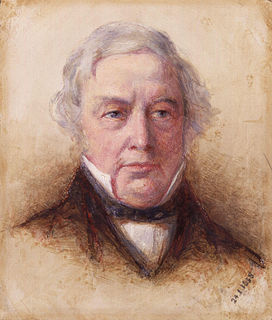A Quote by Thomas Love Peacock
The critic does his utmost to blight genius in its infancy; that which rises in spite of him he will not see; and then he complains of the decline of literature.
Related Quotes
It is what is left to him," said Will. "Do you not recall what he says to Lucie? 'If it had been possible... that you could have returned the love of the man you see before yourself- flung away, wasted, drunken, poor creature of misure as you know him to be- he would have been conscious this day and hour, in spite of his happiness, that he would bring you misery, bring you to sorrow and repetance, blight you, disgrace you, pull you down with him
From the root, the sap rises up into the artist, flows through him, flows to his eye. Overwhelmed and activated by the force of the current, he conveys his vision into his work. And yet, standing at his appointed place as the trunk of the tree, he does nothing other than gather and pass on what rises from the depths. He neither serves nor commands he transmits. His position is humble. And the beauty at the crown is not his own; it has merely passed through him.
Christ and the life of Christ is at this moment inspiring the literature of the world as never before, and raising it up a witness against waste and want and war. It may confess Him, as in Tolstoi's work it does, or it may deny Him, but it cannot exclude Him; and in the degree that it ignores His spirit, modern literature is artistically inferior. In other words, all good literature is now Christmas literature.
Society is a republic. When an individual endeavors to lift himself above his fellows, he is dragged down by the mass, either by means of ridicule or of calumny. No one shall be more virtuous or more intellectually gifted than others. Whoever, by the irresistable force of genius, rises above the common herd is certain to be ostracized by society, which will pursue him with such merciless derision and detraction that at last he will be compelled to retreat into the solitude of his thoughts.
As we seek the Lord ever more diligently, we will surely find Him. We will see clearly that the Lord does not abandon His Church or His faithful Saints. Our eyes will be opened, and we will see Him open the windows of heaven and shower us with more of His light. We will find the spiritual strength to survive even during the darkest night.
Perhaps the critics are right: this generation may not produce literature equal to that of any past generation-who cares? The writer will be dead before anyone can judge him-but he must go on writing, reflecting disorder, defeat, despair, should that be all he sees at the moment, but ever searching for the elusive love, joy, and hope-qualities which, as in the act of life itself, are best when they have to be struggled for, and are not commonly come by with much ease, either by a critic's formula or by a critic's yearning.
THE SUFFERING OF GENIUS AND ITS VALUE. The artistic genius desires to give pleasure, but if his mind is on a very high plane he does not easily find anyone to share his pleasure; he offers entertainment but nobody accepts it. That gives him, in certain circumstances, a comically touching pathos; for he has no right to force pleasure on men. He pipes, but none will dance: can that be tragic?
This Church is true. It will weather every storm that beats against it. It will outlast every critic who rises to mock it. It was established by God our Eternal Father for the blessing of His sons and daughters of all generations. It carries the name of Him who stands as its head, even the Lord Jesus Christ, the Savior of the world. It is governed and moves by the power of the priesthood. It sends forth to the world another witness of the divinity of the Lord. Be faithful, my friends. Be true. Be loyal to the great things of God which have been revealed in this dispensation.
A man may have lived all of his life in the gray, and the land and trees of him dark and somber. The events, the important ones, may have trooped by faceless and pale. And then-the glory-so that a cricket song sweetens his ears, the smell of the earth rises chanting to his nose, and dappling light under a tree blesses his eyes. Then a man pours outward, a torrent of him, and yet he is not diminished.
The great genius does not let his work be determined by the concrete finite conditions that surround him, whilst it is from these that the work of the statesman takes its direction and its termination. ... It is the genius in reality and not the other who is the creator of history, for it is only the genius who is outside and unconditioned by history.







































